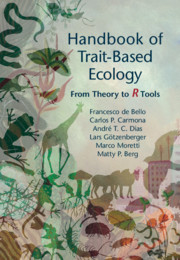Book contents
- Handbook of Trait-Based Ecology
- Handbook of Trait-Based Ecology
- Copyright page
- Epigraph
- Contents
- Preface
- 1 General Introduction
- 2 Trait Selection and Standardization
- 3 The Ecology of Differences
- 4 Response Traits and the Filtering Metaphor
- 5 Community Metrics
- 6 Intraspecific Trait Variability
- 7 Community Assembly Rules
- 8 Traits and Phylogenies
- 9 Effects of Traits on Ecosystem Processes and Services
- 10 Response and Effect Traits across Trophic Levels
- 11 Trait Sampling Strategies
- 12 Applied Trait-Based Ecology
- References
- Index
5 - Community Metrics
Published online by Cambridge University Press: 08 March 2021
- Handbook of Trait-Based Ecology
- Handbook of Trait-Based Ecology
- Copyright page
- Epigraph
- Contents
- Preface
- 1 General Introduction
- 2 Trait Selection and Standardization
- 3 The Ecology of Differences
- 4 Response Traits and the Filtering Metaphor
- 5 Community Metrics
- 6 Intraspecific Trait Variability
- 7 Community Assembly Rules
- 8 Traits and Phylogenies
- 9 Effects of Traits on Ecosystem Processes and Services
- 10 Response and Effect Traits across Trophic Levels
- 11 Trait Sampling Strategies
- 12 Applied Trait-Based Ecology
- References
- Index
Summary
Chapter 5 provides concepts and tools to characterize the functional trait structure of communities. Various indices are introduced, mainly community weighted mean (CWM) and various functional diversity (FD) indices. The power and the limitations of CWM are discussed. Various indices of FD, which expresses the extent of trait differences between organisms, are introduced to simplify their use and interpretation. The broad classification into ‘families’ of indices, i.e. functional richness, functional evenness and functional divergence, is discussed. A selection of indices, with their ability to provide a measure of FD at different scales (alpha, beta and gamma diversity), is discussed, together with other emerging components such as functional redundancy and functional rarity. A discussion on existing R tools, with their potential tricks and problems, is provided, also with examples available in the R material accompanying this chapter.
Keywords
Information
- Type
- Chapter
- Information
- Handbook of Trait-Based EcologyFrom Theory to R Tools, pp. 75 - 104Publisher: Cambridge University PressPrint publication year: 2021
Accessibility standard: Unknown
Why this information is here
This section outlines the accessibility features of this content - including support for screen readers, full keyboard navigation and high-contrast display options. This may not be relevant for you.Accessibility Information
- 6
- Cited by
